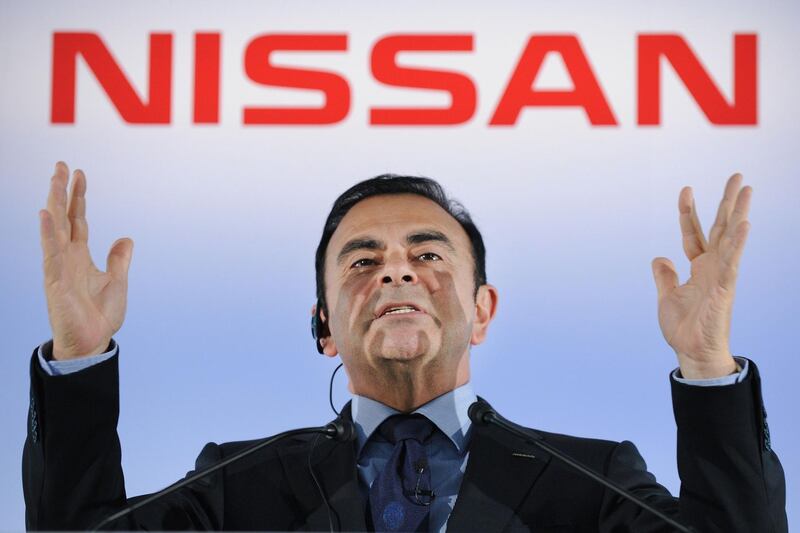A Tokyo court rejected a request from prosecutors to extend Carlos Ghosn’s jail detention, raising questions over the fallen car titan’s future a month after the former Nissan Motor chairman was arrested on allegations of under-reporting his income.
The court rejection doesn’t necessarily mean Mr Ghosn will be out of jail immediately because prosecutors have the right to appeal in a higher court or indict him on another charge, NHK said. The court would also need to approve a bail request from his lawyers. Mr Ghosn was detained on November 19 in Tokyo and the court kept extending his detention amid an indictment earlier this month for under-reporting his income.
Mr Ghosn could be released on bail today or tomorrow, national broadcaster NHK reported. If Mr Ghosn was to be released on bail, he will be out as early as tomorrow, Mr Ghosn’s lawyers said. Nissan declined to comment.
The Tokyo district court also rejected an extension for Mr Ghosn aide Greg Kelly.
Mr Ghosn, 64, was whisked away from his corporate jet upon landing in Tokyo on November 19 and was indicted on December 10, while simultaneously being re-arrested for concealing income for another time period. Mr Ghosn has denied wrongdoing.
____________
Read more:
[ Nissan board shirks naming Ghosn replacement as tensions escalate ]
[ Renault to keep Carlos Ghosn as CEO ]
[ Ghosn appeal rejected as former Nissan chief re-arrested on new charges ]
[ Nissan moves to block Ghosn access to Rio flat ]
[ Ghosn's arrest may spur global backlash against Japan ]
____________
The French-Brazilian -- widely credited with saving Nissan from failure and bringing it together with Renault -- stands accused for under-reporting his income by tens of millions of dollars. The arrest has heightened tensions between Nissan and Renault, casting doubt over the viability of their alliance and highlighting the rift between the French and Japanese manufacturers over their respective powers within each others’ boardrooms.
If proven, Mr Ghosn’s alleged offense may carry a sentence of as much as 10 years. The formerly high-flying executive has also been accused by Nissan of misusing company funds, including to buy homes from Brazil to Lebanon.
In addition, Nissan as well as former representative director Mr Kelly, who was accused of wrongdoing and arrested with Mr Ghosn, were also indicted. Under the Japanese system, indictment allows prosecutors to lay formal charges.
Mr Ghosn’s lawyers have said the charge that he helped himself by converting compensation to deferred pay is flawed because the compensation agreement wasn’t properly ratified, according to a statement by the office of Motonari Otsuru, Mr Ghosn’s lawyer. Mr Otsuru is a former head of a special investigation task force of the Tokyo public prosecutor’s office.
Nissan’s board on November 22 removed Ghosn from the post of chairman and American citizen Mr Kelly from his position. Nissan’s partner Renault has so far not removed Mr Ghosn from the post of chief executive officer, but instead appointed an interim person to the role.
Disagreements within the world’s biggest automotive alliance that was spearheaded by Mr Ghosn have all but exploded since his arrest. Renault’s most powerful shareholder, the French state, has stressed Mr Ghosn should be considered innocent until proven guilty and demanded that Nissan share all evidence it has gathered.
Nissan CEO Hiroto Saikawa traveled to Amsterdam for a December 18 meeting of the alliance between Nissan, Renault and the third partner, Mitsubishi Motors. While there, he had a one-on-one meeting with Renault interim chief Thierry Bollore that Mr Saikawa described as “positive” and “productive,” according to Nissan.
Mr Saikawa has emerged as a driving force in the investigation about the alleged wrongdoing by Mr Ghosn and Mr Kelly. Renault, Nissan’s largest shareholder and the company that bailed out the Japanese automaker two decades back, has been pressing for specifics, as has the French government.
The arrests were the result of a coup by executives including Mr Saikawa, Kelly’s wife, Dee Kelly, said in a video released Wednesday. Mr Saikawa was asked on the day Mr Ghosn and Mr Kelly were arrested whether a coup was underway at Nissan. He replied: “That is not my understanding. I didn’t make such an explanation and think you should not think of it that way.”





